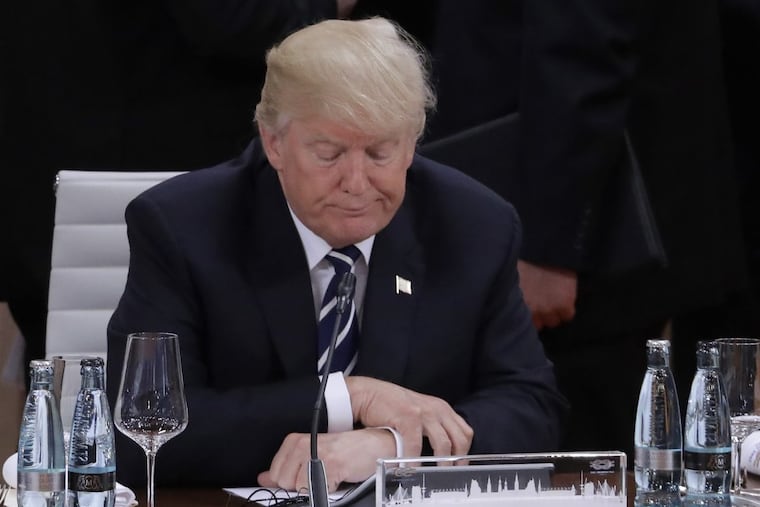Trump's attacks on the press violate nation's founding principles
Liberty is not safe, Jefferson says, "Without information. But where the press is free, and every man able to read, all is safe."

President Trump has decided that calling the press "the enemy of the American people" was not enough. So he retweeted a pantomime of his war on the press, showing the president grounding and pounding a CNN-logo-headed man, WWE-style. Then the White House let it be known that it was thinking of actually pounding CNN by refusing to approve its parent company's merger with AT&T.
Of course, his defenders say, this is just the sort of irreverent hijinks that make Trump beloved among voters, reminding them that this is no mealy-mouthed, PC politician. This is a president who will "punch back" against his enemies.
But in the wake of our July Fourth celebrations, the voices of the Founders are whispering that when the press is beaten down, so is democracy. In fact, say the Founders, the press isn't just important to democracy, it's the sine qua non: a Latin phrase meaning, "Without which, none." In other words, if no free press, then no free country, no democracy.
"A popular government without popular information or the means of acquiring it, is but a prologue to a farce or a tragedy or perhaps both," said James Madison. "Knowledge will forever govern ignorance, and a people who mean to be their own governors must arm themselves with the power knowledge gives." And where will that knowledge come from? Here Thomas Jefferson chimes in. Liberty is not safe, he says, "Without information. But where the press is free, and every man able to read, all is safe."
But surely Trump's actions don't imperil an independent press. He has not legally restricted press freedom; all he's done is to impugn the news. Nonetheless, the World Press Freedom Index has lowered the U.S. ranking, to 43rd in world press freedom, falling from 41st due to "highly toxic antimedia discourse that drove the world into a new era of post-truth, disinformation and fake news."
In using presidential rhetoric to help assess press freedom, the Freedom Index is channeling Scottish statesman Andrew Fletcher, who said, "If one person were to write the ballads of a country, he would not need not to care about who makes the laws." More powerful than laws, Fletcher is saying, are the culture's stories about what is true and good, and what is not.
A president's bully pulpit is a ballad factory. Already a majority of Trump's supporters (51 percent) say the press is "an enemy to people like them," with another 36 percent saying the media is "unfriendly" to them.
All together, that's 87 percent of Trump supporters who, at Trump's behest, are alienated from "popular information, and the means of acquiring it." As an alternative, they repair to FOX News, whose viewers have proven, in repeated surveys, to be the most misinformed of all media consumers. Indeed, surveys of Trump voters, tutored as they are by FOX, show them to be especially "low information voters."
Of course, other presidents have taken issue with the news media. Ronald Reagan called them "the Bad News Bearers," and Bill Clinton liked to carry around a book called Out of Order, which was critical of the press. But none of them attacked the integrity of the press as Trump has. None accused the press of being a partisan hack, deliberately doling out Fake News and False Facts, as Trump has.
Let's also stipulate that the U.S. press is not a perfect institution. It is a fundamentally commercial press, so it tends to favor sensation over substance. Also for commercial reasons, the news can't stray far from the common sense of its audience, so when it tells "both sides" of the story, that usually means an Establishment liberal and an Establishment conservative. The many other sides of the story are often left on the cutting-room floor.
But our nation's news media also have virtues. One of them, whose importance has only recently begun to be appreciated, is that the press tries to get the facts right. The undeniable proof that the press is serious about the facts emerges when some reporter gets the facts wrong: heads roll, as three CNN reporters recently found out.
Trump negates this virtue with his two-word incantation, "Fake news." And with that, presto, even the basic facts are lost to voters in a fog of denial and accusation. Did the Russians interfere with our election? Will Trumpcare be "fabulous"? Would the Muslim travel ban have saved any lives if it had been in place for the last 20 years?
On these important questions and others like them, the press has compiled an impressive record of information and answers, which will, tragically, be dismissed by many voters as the agenda of ideologically motivated hacks. As in Matthew Arnold's poem "Dover Beach," voters are left, "as on a darkling plain, swept with confused alarms of struggle and of flight, where ignorant armies clash by night."
In this month 241 years ago, our forefathers were promulgating their new Declaration of Independence. In tribute, let's recall what they have to tell us: That Trump's attack on the integrity of the news is not the normal give and take between political adversaries; that an attack on the press itself is an attack on the sine qua non of democracy – without which, none.
Calvin F. Exoo is a professor of government at St. Lawrence University in Canton, N.Y., and the author of books and articles on mass media and freedom of the press. fexoo@stlawu.edu